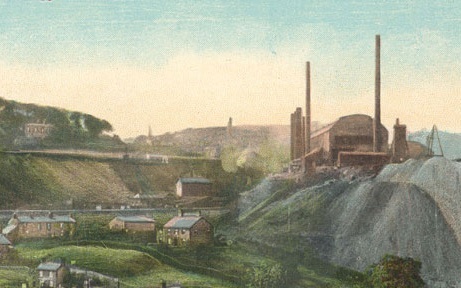You are currently browsing the category archive for the ‘19th century’ category.

Many earlier documents about Brymbo mention a house, or property, called “Plas Newydd” – “new hall”. From these documents it is clear that the house was part of the Brymbo Hall estate. It is also clear that neither the house nor the placename can now be found.
One thing we do know is that the property pre-dated the steelworks, and had its own land attached to it. It certainly appears on the Land Tax assessments of 1798 amongst the lands then owned by “Jno. Wilkinson Esq“, where a Robert Jones is recorded as the occupier of “Half Plasne.d“, assessed at three shillings and sixpence, with the remaining half occupied by Wilkinson himself.
However, it also appears on township rate books well back in the 18th century: Richard Jones is rated for “Plaise Newydd” in the 1730s, and Evan Edwards a little later on. Lastly, Edward Jones, gent, is described in a deed of 1695 as being “of Plas Newydd” in Brymbo.
A few years back I wrote down some notes on the Gyfynys, Brymbo, and the family called Powell who had once owned the house and estate. Although you can still find the name on maps, the Gyfynys itself vanished perhaps two centuries ago, so its site needs to be searched for carefully.
If you walk eastwards down Glyon Lane, Brymbo, towards its border with the township of Gwersyllt, you will come to a junction with Cae Penty Road. In the angle between the two lanes is a small field, raised above the road level. This is the Gyfynys. Enclosing it to the south and west, and bordering Glyon Lane, is another much larger field: this is Cae Penty, the “House-End Field” (or perhaps “Field of the Main House”), of which Alfred Palmer wrote in 1903:
“this field […] is famed in the neighbourhood for the crop of snowdrops, violets, and other flowers which it yearly bears, presenting the semblance of an old but abandoned garden”
Alongside coal and iron, the Middle Coal Measures of the Denbighshire Coalfield yielded huge quantities of fireclay, which gave rise to a thriving brick industry in the 19th century. Although the clays of Ruabon, and the hard red bricks made from them, were far better-known, the coal outcrops at Brymbo were no exception and there were once a number of brickworks in the Brymbo area, some of which survived until comparatively recently, and which produced both firebricks and “common bricks” for industrial and domestic uses. Although a lower-profile industry than the coal mines and less prestigious than the iron foundries, the brickyards were another characteristic part of the East Denbighshire landscape.
As with the collieries, I’ll start with a look at the Brymbo Company of Henry Robertson and the Darby brothers, operators of the Brymbo ironworks and much else besides.
The turnpike roads came to the area early. An Act of 1758-9, back in the reign of George II, provided for the upgrade of the roads from “the town of Mold to the town of Denbigh, and from thence to Tal y Cafn and Conway, and from the town of Wrexham to the towns of Ruthin and Denbigh“. It was the Wrexham-Ruthin section, passing through Gegin Wen close to the township border and thence across the bleak moorland by Maes Maelor, that was finally to drag the inhabitants of Brymbo firmly into the 18th century.
North and west of Brynmally colliery lies an attractive area of small, wooded hills, tiny deep-banked lanes, and old farmhouses, with a few relics of an industry that it is now difficult to imagine ever being here. The parishes of Wrexham, Gresford and Hope meet at this point, the latter lying across the Cegidog to the north. Much of the area is now given the name of Ffrwd – over the years it has also been spelt in the Anglicised form “Frood”, the latter particularly applied to John Thompson‘s colliery and ironworks which once occupied land at the very extremity of Brymbo township.
Read the rest of this entry »
